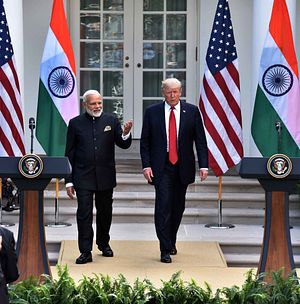On May 23, India will have a new government, and the stakes are bigger than many foreign policy watchers in Washington realize. Indian elections are notoriously difficult to predict, and we could see a range of results following a campaign that has been fiercely contested on issues of economic performance, national security, and identity. No matter what the outcome, the question of whether we see continuity or change in India’s foreign policy has implications for U.S. long term interests in Asia.
Since coming to power in in 2014, Prime Minister Narendra Modi has pursued a more active foreign policy than any Indian government in recent years. Under his leadership, India has taken actions to support the rules-based international order. High among these are India’s moves to support freedom of navigation, back the principle of territorial integrity and national sovereignty, and support economic development that follows best practices in international development. In the face of rising global tensions, the United States has more than a passing interest in seeing India maintain its growing presence on the world stage.
India is the world’s largest democracy and U.S. administrations from both political parties have prioritized stronger relations with India for the better part of 20 years. But Modi’s more assertive foreign policy is new.
Since winning its independence from Great Britain in 1947, and particularly during the Cold War, India was a leader of the nonaligned movement, positioning itself as neutral between the United States and the Soviet Union. Since the end of the Cold War, India has remained fiercely protective of its strategic autonomy and the option to work with a variety of partners as the situation demanded.
Nevertheless, the trajectory of India’s foreign policy under Modi has been positive for the United States. Modi jettisoned the nonaligned movement that had defined Indian foreign policy for decades and fashioned himself as a leader of a global power. He brought new coherence to India’s foreign policy and took positions that benefited not only India but also tried to uphold a set of rules for other countries to follow.
For example, India chose to abide by a 2014 decision of the Hague Tribunal in its long-standing maritime dispute with Bangladesh. In 2015, India decided to adopt a multistakeholder model of internet governance, in contrast with Russia and China. In 2016, India backed the Hague international tribunal in the China-Philippines territorial dispute. In 2017, and then in again in 2019, India took a principled public position against China’s Belt and Road Initiative.
Another example is India’s role in the Indo-Pacific region. India is slowly but surely finding its own way to position itself in a region that is increasingly dominated by China’s rise. Like many major powers, India has to balance its own bilateral economic ties to China with concerns about Chinese military expansionism and predatory lending.
India has developed its own Indian Ocean strategy, which includes a joint fusion center for information sharing, new agreements for technical and information exchanges with the United States, and stronger relations with countries like Sri Lanka and Maldives that are increasingly dependent on Chinese investment.
Indian foreign policy is not solely focused on containing China, of course, nor has it shifted completely toward partnership with the United States. Yet, given the overarching preoccupation with managing China’s rise, it is hard to imagine India walking away from the meaningful steps it has taken in recent years to strengthen its partnerships with countries to manage China’s rising influence in South Asia.
New Delhi isn’t making these decisions to please Washington. It’s taking them because they are in its interest. These actions are consistent with India’s evolving picture of its strategic autonomy and therefore is expected to continue no matter who prevails in the elections.
However, if India retreats, the United States will lose a partner in Asia at a time when it can hardly afford to do so.
Sumona Guha is a Vice President at Albright Stonebridge Group, a global business strategy firm. Prior to that, she served 18 years in the U.S. government, including in the the Office of the Vice President of the United States, the Office of the Under Secretary of State for Political Affairs, and the Secretary of State’s Policy Planning office, as well as in U.S. embassies in Moscow and Paris.

































